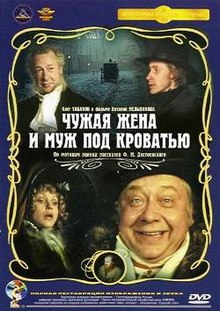|
Another Man's Wife and a Husband Under the Bed (film)
Another Man's Wife and a Husband Under the Bed (Russian: Чужая жена и муж под кроватью, romanized: Chuzhaya zhena i muzh pod krovatyu) is a 1984 Soviet TV comedy film directed by Vitaly Melnikov. It is based on the 1848 story by Fyodor Dostoevsky of the same name. PlotThe film is a vaudevillian story about a solid, venerable, jealous husband (Oleg Tabakov) who is searching for his frivolous wife (Marina Shimanskaya). He winds up in someone else's apartment, and finds himself under the bed of an unknown woman (Marina Neyolova). He shares the hiding place with an unknown man (Stanislav Sadalsky), who is also there by accident. Cast
Crew
FilmingAccording to Vitaly Melnikov, everyone had fun making the movie. The only difficulty was getting from under the antique bed which could've collapsed anytime, so Stanislav Sadalsky had to stay down there. He was then joined by Oleg Tabakov, and during pauses both of them simply fell asleep. Yuri Bogatyryov had only one free day, so he invented his costume and changed closes on the way from Moscow to Leningrad, thus upon arrival everyone witnessed a 19th-century nobleman casually walking out of a Soviet train.[1] CriticsWriter Yevgeni Popov called the original story "an amusingly talented, funny, light, playful thing" written by a "then-lad Dostoevsky", and noted that a significant part of future absurdists such as Daniil Kharms or Nikolay Oleynikov owed him. Popov also recommended to watch the movie, highlighting the acting and Oleg Yefremov's work in particular. "Usually such a severe man flexing his jaw muscles, here he appears as an elderly relaxed gentleman".[2] References
External links
|
||||||||||||||||||||||||||||
